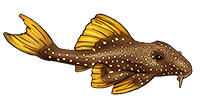Hybreed synos ?
Hybreed synos ?
I have been reading lot on hybreed Synodontis catfishes and was just wondering why they are so common. How come ? Are they so easy to make or what ?
-
Marc van Arc
- Expert
- Posts: 5038
- Joined: 19 Dec 2004, 14:38
- My articles: 20
- My images: 61
- My catfish: 9
- Spotted: 35
- Location 2: Eindhoven, The Netherlands
- Richard B
- Posts: 6952
- Joined: 11 Aug 2006, 13:19
- I've donated: $20.00!
- My articles: 9
- My images: 11
- My cats species list: 37 (i:0, k:0)
- My aquaria list: 4 (i:0)
- My BLogs: 2 (i:0, p:47)
- Spotted: 10
- Location 1: on the sofa, or maybe at work?
- Location 2: Warwickshire: UK
- Interests: Tanganyika Catfish, African catfish, Non-loricariid sucker-catfish.
Running, drinking, eating, sci-fi, stapelids
Hi there
Hybrids come into being in one of three ways...
1 - there is a remote possibility it occurrs naturally, there are examples in Corydoras & it may be a possibility but it's not the stuff we're generally on about in these forums.
2 - commercial breeders try to create something a bit different. Fine if that's your thing & fish are clearly labelled as such
3 - commercial breeders create cross bred fish where they get many young from difficult to breed species & they enter the trade as the genuine thing, fooling unsuspecting purchasers. Typically this has happened to the Tanganyikan species; granulosus, multipunctatus & petricola. Granulosus are expensive & only produce a few eggs so a tidy profit can be made by selling easy to produce hybrids as the genuine article.
The above is a quick generalisation as petricolas (now Lucipinnis) & multipunctatus are fairly easy to breed if you know what you're doing.
All the best
Richard B
Hybrids come into being in one of three ways...
1 - there is a remote possibility it occurrs naturally, there are examples in Corydoras & it may be a possibility but it's not the stuff we're generally on about in these forums.
2 - commercial breeders try to create something a bit different. Fine if that's your thing & fish are clearly labelled as such
3 - commercial breeders create cross bred fish where they get many young from difficult to breed species & they enter the trade as the genuine thing, fooling unsuspecting purchasers. Typically this has happened to the Tanganyikan species; granulosus, multipunctatus & petricola. Granulosus are expensive & only produce a few eggs so a tidy profit can be made by selling easy to produce hybrids as the genuine article.
The above is a quick generalisation as petricolas (now Lucipinnis) & multipunctatus are fairly easy to breed if you know what you're doing.
All the best
Richard B
- MatsP
- Posts: 21038
- Joined: 06 Oct 2004, 13:58
- My articles: 4
- My images: 28
- My cats species list: 117 (i:33, k:0)
- My aquaria list: 10 (i:8)
- My BLogs: 4 (i:0, p:97)
- Spotted: 187
- Location 1: North of Cambridge
- Location 2: England.
I think Richard hits the nail on the head with the reason for their existance being either "Something different" or "Lookalike to an expensive/hard-to-breed" species.
They are not really easy to create (as far as I understand), as it takes having access to certain hormones and injecting those into the fish, which of course isn't necessarily something you can achieve "at home". But professional breeders with low-levels of scruples can certainly achieve this.
--
Mats
They are not really easy to create (as far as I understand), as it takes having access to certain hormones and injecting those into the fish, which of course isn't necessarily something you can achieve "at home". But professional breeders with low-levels of scruples can certainly achieve this.
--
Mats




